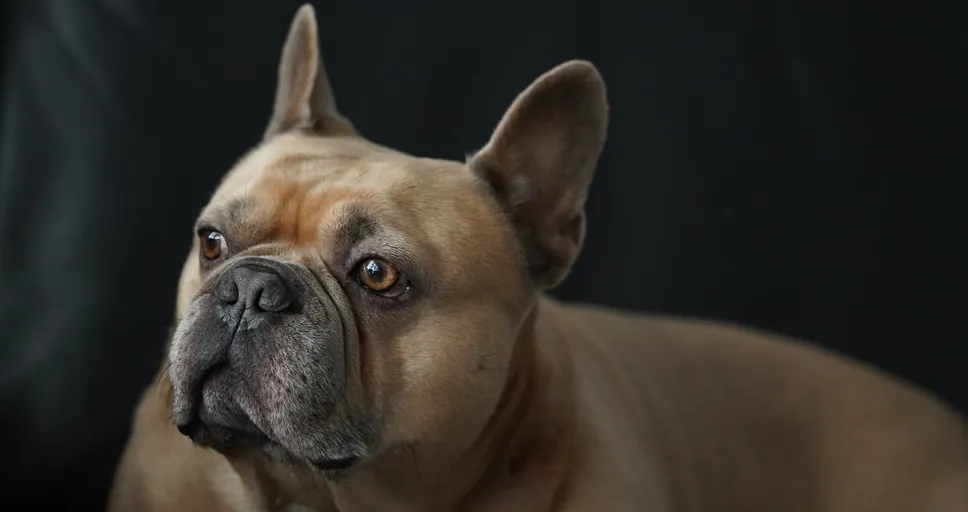Ever wondered why French Bulldogs are so expensive? It’s not just because they’re unbelievably cute and have faces that can melt the coldest of hearts! Nope, it turns out there’s a whole economy behind these pint-sized pups that makes them as pricy as a small car.
As we delve into the reasons behind their hefty price tag, you’ll see it’s a mix of breeding challenges, high maintenance costs, and a market that just can’t get enough of them. Whether you’re just curious or seriously considering adding a Frenchie to your family, understanding these factors will surely give you a new perspective on the world of pet ownership—where love might just be the cheapest thing involved!
- French Bulldogs are costly due to breeding difficulties; they require artificial insemination and often cesarean sections, which increase costs.
- They have smaller litters (typically 3-4 puppies), pushing breeders to charge more per puppy to cover high overheads.
- Their popularity and celebrity endorsement lead to high demand and limited supply, driving up prices.
- French Bulldogs face health issues like respiratory problems, necessitating frequent vet visits and potentially high insurance costs.
- Understanding these factors helps prospective owners appreciate the significant investment involved in owning a French Bulldog.
Table of Contents
- 1 Why Are French Bulldogs So Expensive
- 2 Breeding Challenges
- 3 Healthcare and Maintenance Costs
- 4 Market Demand and Popularity
- 5 The Role of Pedigree and Genetics
- 6 Lifestyle and Upkeep Requirements
- 7 Legal and Ethical Considerations
- 8 Frequently Asked Questions
- 8.1 Are French Bulldogs worth buying?
- 8.2 What is the downside of French bulldogs?
- 8.3 Why are French Bulldogs so special?
- 8.4 Why do so many people love French Bulldogs?
- 8.5 Why are French Bulldogs so expensive?
- 8.6 What is so special about French Bulldogs?
- 8.7 Why do people like French bulldogs so much?
- 8.8 What I wish I knew before getting a French bulldog?
- 8.9 Why are French Bulldogs so valuable?
- 8.10 Are French bulldogs a good investment?
- 8.11 What two breeds make a French Bulldog?
- 9 Conclusion
- 10 Recommended Authors For Further Reading
Why Are French Bulldogs So Expensive
If you’ve ever sticker-shocked yourself while browsing for a French Bulldog, you’re not alone. So, why are French Bulldogs so expensive? Is it their snorty laughs, those bat-like ears, or the fact that they’re more than happy to play couch potato right along with you? Well, it turns out, the answer lies deeper than their squishable face folds and expressive, ‘feed me, maybe?’ eyes.
First off, let’s talk about the elephant in the room: the cost of breeding. French Bulldogs can’t breed naturally due to their physical structure—those adorable, compact bodies and large heads mean natural birth is a no-go; cesarean sections are the norm. This not only spikes the costs but also adds a layer of risk to the whole process, requiring breeders to have a vet on speed dial.
And then there’s the numbers game. Unlike some breeds that can have litters as large as ten puppies, Frenchies usually max out at three or four. Fewer puppies per litter mean breeders have to charge more per puppy to cover their overheads, ranging from medical costs for the mother to the intensive care needed to ensure the puppies thrive in their first few weeks.
Beyond the breeding, the demand for these charming pups is off the charts. It’s like every celebrity decided they needed a Frenchie by their side, and the rest of the world followed suit. High demand and limited supply? That’s a recipe for a price surge if ever there was one.
Not to mention, the care French Bulldogs require isn’t exactly cheap. Their health can be a bit of a lottery with common issues like respiratory problems and allergies necessitating regular vet visits. Insurance, anyone?
So there you have it. Between the complex breeding, the limited litter sizes, their celebrity status, and a handful of health needs, it’s clear why French Bulldogs command the price tag they do. They might be small, but the investment in bringing one into your home is anything but. Just make sure if you’re diving into those wallet-draining waters, you’re ready for the splash!
Breeding Challenges
Diving into the world of French Bulldog breeding is like stepping into a complex drama filled with twists, turns, and some real head-scratchers. This is the first of many reasons why French Bulldogs are so expensive. The process of breeding these adorable creatures is packed with challenges that not only require patience but also a small fortune.
Firstly, natural breeding for French Bulldogs is almost like mission impossible. Their uniquely shaped bodies—those adorable, compact frames and disproportionately large heads—make natural mating a rare event. Most French Bulldog breeders rely on artificial insemination to ensure pregnancy, which involves a fair bit of professional intervention and, you guessed it, costs.
Once the pregnancy is confirmed, things don’t get easier. Due to their peculiar anatomy, most French Bulldog mothers can’t give birth naturally. The risk of dystocia (difficult labor) is high, and as a result, the vast majority of French Bulldog litters are delivered via cesarean section. This not only adds a significant cost from surgical and medical care but also requires breeders to constantly monitor the health of the mother before, during, and after the birth process.
But wait, there’s more! The challenges don’t end at birth. French Bulldog litters are notoriously small—often just three or four puppies. This scarcity is a breeding challenge because it limits the number of puppies that can be sold, increasing the financial burden on breeders who must spread their high costs across fewer sales. Moreover, each of these little pups needs intensive care to ensure they grow into healthy, robust dogs, which means more time, more vet visits, and yes, more money.
In addition to all the hands-on work, ethical breeding practices also require genetic testing and health screenings to prevent the propagation of common genetic disorders found in French Bulldogs. These tests are essential but come with a hefty price tag, further contributing to the overall costs of breeding.
So next time you wonder why French Bulldogs are so expensive, remember that behind every price tag is a breeder who likely navigated a small minefield just to bring those squishy faces into the world. It’s not just a business; it’s an adventure fraught with challenges and costs at every turn!
Healthcare and Maintenance Costs

Let’s face it: owning a French Bulldog is like having a high-maintenance friend who can’t speak but has every other expressive feature dialed up to eleven. And this, my friends, is a sneak peek into why French Bulldogs are so expensive—not just to buy but to maintain. Buckle up, because we’re about to dive into the wallet-whirling world of Frenchie healthcare and maintenance.
First off, those adorable pushed-in noses? They’re not just for cute snorts and comedy snoring. Brachycephalic airway syndrome is a fancy term for breathing issues associated with short-nosed breeds, and it’s as troublesome as it sounds. This can lead to all sorts of complications, from heat intolerance to life-threatening respiratory distress. Regular check-ups with the vet to monitor these issues? Cha-ching!
Then, there are the allergies. Oh, the allergies! Frenchies can be allergic to anything from chicken to your average household dust. Managing these allergies often means special diets, frequent vet visits, and sometimes even custom treatments, all of which add to the ongoing costs of Frenchie ownership.
Let’s not forget about their skin. Those wrinkles might be perfect for storing treats for later (just kidding, please don’t do that), but they also harbor bacteria and require regular cleaning. Think of it as a daily skincare routine but for your dog. And just like the best skincare products, the costs do add up!
And because we’re on the topic of healthcare, we must talk about their predisposition to a variety of other health issues, such as spinal disorders, hip dysplasia, and heart defects. Each of these conditions not only means more vet visits but potentially surgeries and long-term treatments, which all contribute to the high maintenance costs of these pups.
So, when you tally up the regular vet visits, the special diets, the allergy treatments, and the potential for serious health issues, it becomes painfully clear why the costs of keeping a French Bulldog healthy can quickly become a significant expense. This ongoing financial commitment is a big reason why French Bulldogs are so expensive to maintain, making them as much of a budgetary consideration as they are a family addition. But let’s be honest, for many, the joy and companionship of a Frenchie are worth every penny.
Market Demand and Popularity
Why are French Bulldogs so expensive? Well, grab your popcorn, because we’re about to explore how these pups became the equivalent of designer handbags in the canine world. It’s not just about their charming looks or their ability to snore louder than your uncle Joe; it’s the sheer demand that drives their price sky-high.
Imagine walking down the street and every third person you see is holding a cup of that trendy new coffee flavor—that’s how popular Frenchies have become. They’ve turned into a social media sensation, with celebrities and influencers flaunting these snorty, bat-eared companions as the latest must-have accessory. This visibility has catapulted their popularity, making them more than just pets; they’re a status symbol.
The surge in popularity isn’t just because they’re cute and compact—perfect for urban living—but also because they have a demeanor that makes them great companions. They’re known to be particularly good in smaller spaces, and their laid-back attitude means they’re less likely to run you ragged after a long day at work.
However, with great demand comes great… price tags. As more and more people want French Bulldogs, breeders can barely keep up. This isn’t a new iPhone release where production can be ramped up at will; these are live animals with specific breeding needs, which we’ve already talked about. The result? A ballooning cost because supply simply cannot keep up with the demand.
Moreover, every time a Frenchie pops up on a celebrity’s Instagram, you can practically hear the cash registers ringing as more and more people decide they need one of these dogs in their life. This phenomenon isn’t slowing down either. As their popularity soars, so does the insistence on owning one, thereby feeding back into the cycle of high demand and high pricing.
So, next time someone asks you why French Bulldogs are so expensive, you can point them to their nearest social media feed. Chances are, there’s a Frenchie being adorably ridiculous, and someone out there watching, ready to pay whatever it takes to bring one home.
The Role of Pedigree and Genetics

Why are French Bulldogs so expensive? Buckle up, because the world of pedigree and genetics not only sounds like it’s straight out of a sci-fi novel, but it’s also crucial in understanding the hefty price tag on these adorable pups.
When you’re buying a French Bulldog, you’re not just buying a pet; you’re investing in a bundle of carefully curated genes. The role of pedigree—that illustrious family tree—plays a massive part in this. Breeders often highlight the lineage of their Frenchies, tracing back to champion lines or particularly desirable traits. This isn’t just fluff; it’s a guarantee of the dog’s quality and conformity to breed standards which, let’s be honest, is like having a royal bloodline in the dog world.
Now, let’s talk genetics. French Bulldogs come packed with a genetic makeup that’s as carefully considered as the ingredients in a gourmet recipe. Each trait, from their signature bat ears to their distinctively short tails, is influenced by their genes. Breeders spend a lot of time (and money) ensuring these traits are passed on correctly, which involves genetic testing and selective breeding. This meticulous process is key to producing healthy, well-formed dogs that meet breed standards, but it also racks up the costs significantly.
Moreover, this focus on genetics means that when you get a French Bulldog, you’re getting a dog whose health, appearance, and even temperament have been optimized. But maintaining this level of genetic purity requires avoiding inbreeding while still keeping the desirable traits strong, a balancing act that is as costly as it is complex.
So, the next time you wonder why French Bulldogs are so expensive, think about the science and strategy involved in their creation. You’re not just paying for a dog; you’re paying for decades of selective breeding and genetic research that ensure your new companion is not only charming and loving but also a walking masterpiece of canine genetics. This makes each Frenchie not just a pet, but a continuation of carefully curated genetic artistry.
Lifestyle and Upkeep Requirements
When you’re pondering over why French Bulldogs are so expensive, don’t forget about the day-to-day joys and juggling acts involved in their upkeep. Owning a Frenchie isn’t just a purchase; it’s a lifestyle—a chic, sometimes chaotic, definitely costly lifestyle.
First things first: let’s talk living arrangements. French Bulldogs are the ultimate apartment dogs. They don’t need a backyard the size of a football field—just a cozy corner and some sunshine will do. However, their adaptability to small spaces doesn’t mean they’re low maintenance. These pups thrive on attention and can develop separation anxiety if left alone too long. So, if your lifestyle involves long hours away from home, you might need to budget for doggy daycare or a pet sitter, and those costs add up fast!
Next up, grooming. Despite their short hair, Frenchies require regular grooming to keep their coat shiny and skin healthy. Those adorable wrinkles need cleaning to prevent bacterial infections, and let’s not forget their nails and ears. It might not sound like much, but regular trips to the groomer or even stocking up on at-home grooming supplies can carve a noticeable chunk out of your wallet.
Exercise is another key aspect. While they’re not exactly aspiring marathon runners, French Bulldogs do need their daily dose of activity to keep them healthy and prevent obesity, which can lead to a slew of other health issues. This means daily walks, interactive play sessions, and, yes, those hilarious attempts at fetch which often end in a snort-fest rather than an actual retrieve.
Diet is where things get really specific. French Bulldogs have sensitive stomachs and can be quite finicky eaters. Special diets for allergies or sensitivities are common, and these aren’t your off-the-shelf kibble. Specialized dog food that meets their nutritional needs without causing distress can be pricey, and given their royal-like status among pets, you wouldn’t want to skimp on the good stuff.
So, when you tally up the costs of doggy daycare, grooming, regular exercise, and a specialized diet, it’s easy to see why French Bulldogs are so expensive to maintain. Each aspect of their daily life requires attention and investment, making the Frenchie lifestyle one that’s lovingly high-maintenance. But for those who take the plunge, the return on investment is measured in affection, companionship, and an endless supply of laughs—all priceless, of course!
Legal and Ethical Considerations

Now, let’s get serious for a moment and dive into the legal and ethical considerations that answer part of why French Bulldogs are so expensive. It’s not just their charm or their penchant for snoring that hikes up the price—it’s also the complex web of responsibilities that ethical breeders adhere to.
Ethical breeding practices are crucial when it comes to French Bulldogs. Due to their popularity, there’s a tempting path to cut corners and breed these dogs without considering their health or wellbeing. Responsible breeders, however, follow strict guidelines to ensure that the dogs are not only healthy but also happy. This includes health screenings, proper veterinary care, and ensuring that breeding practices do not perpetuate the health issues that can be prevalent in the breed.
Legal considerations also play a significant role. Different countries and states have varying regulations concerning the breeding and selling of pets, including licensing requirements, standards for care, and even specific laws aimed at preventing overbreeding and ensuring animal welfare. Complying with these laws can be costly, involving everything from facility inspections to obtaining the necessary permits, all of which add to the overall cost of breeding and, ultimately, to why French Bulldogs are so expensive.
Moreover, there’s an ethical commitment to consider the future of every puppy sold. Ethical breeders often operate with a contract that includes clauses such as spay/neuter agreements, return policies if the owner can’t care for the dog, and health guarantees. These measures are designed to protect the wellbeing of the puppies but also involve additional administrative and legal costs.
On a broader scale, ethical breeders also contribute to the breed’s future by being selective about who buys their puppies. This often means turning down potential sales to ensure that puppies go to homes that can provide proper care and a suitable environment. This selective process, while crucial for the dogs’ welfare, means fewer sales and higher costs to maintain the breeding operation.
So, when considering why French Bulldogs are so expensive, remember that part of the cost goes towards ensuring that these lovable pups are bred and sold responsibly, with a strong emphasis on their health, happiness, and the ethical implications of their popularity. It’s about more than just making money; it’s about making a commitment to the breed and its future.
- French Bulldogs are costly due to their breeding challenges, including the need for artificial insemination and cesarean deliveries, due to their unique body structure.
- They have small litters, usually only three to four puppies, increasing the cost per puppy for breeders.
- High demand and celebrity influence contribute to their high market price.
- Ongoing care costs are substantial, given their susceptibility to health issues like respiratory problems and allergies.
Frequently Asked Questions
Are French Bulldogs worth buying?
French Bulldogs can be worth buying if you are looking for a loyal and affectionate companion, though they do come with high maintenance and health care needs.
What is the downside of French bulldogs?
The downsides of French Bulldogs include their susceptibility to health issues like breathing problems, skin conditions, and joint diseases, which can lead to high veterinary costs.
Why are French Bulldogs so special?
French Bulldogs are special because of their unique appearance, playful yet calm demeanor, and their ability to form strong bonds with their owners.
Why do so many people love French Bulldogs?
Many people love French Bulldogs for their compact size, distinctive bat-like ears, and friendly, easygoing personalities that make them great companions.
Why are French Bulldogs so expensive?
French Bulldogs are expensive due to their popularity, breeding challenges, and high demand, coupled with the costly veterinary care they often require.
What is so special about French Bulldogs?
Why do people like French bulldogs so much?
People are drawn to French Bulldogs for their charming personalities, manageable size, and relatively low exercise needs, making them ideal for urban living.
What I wish I knew before getting a French bulldog?
Before getting a French Bulldog, it is important to know about their potential health problems, high maintenance costs, and the need for regular veterinary check-ups.
Why are French Bulldogs so valuable?
French Bulldogs are considered valuable due to their rarity, the difficulty and cost of their breeding process, and their strong appeal as a status symbol and companion pet.
Are French bulldogs a good investment?
While French Bulldogs can be a good emotional investment as companions, financially they may be costly due to high initial prices and ongoing health care expenses.
What two breeds make a French Bulldog?
Conclusion

So, why are French Bulldogs so expensive? If you’ve been following along, you know it’s not just one thing—it’s a combination of factors, each adding layers of costs and care that pump up their price tag. From their irresistible charm and celebrity-fueled popularity to the intricate dance of genetics and breeding, owning a Frenchie is an investment in both heart and wallet.
We’ve explored the intense breeding challenges that involve high costs for artificial insemination and cesarean births, and the continuous healthcare expenses driven by their adorable but high-maintenance physical structure. Their skyrocketing market demand turns them into little furry gold nuggets in a market that can’t seem to get enough. And let’s not overlook the ethical breeding practices and legal hoops that responsible breeders jump through to ensure these pups are healthy, happy, and ethically brought into the world.
Every aspect of owning a French Bulldog, from their lifestyle needs to the legal and ethical standards for their breeding, contributes to their hefty price tag. But for many, the cost is justifiable by the sheer joy and companionship these little dogs bring into their lives. They may be expensive, but their love and loyalty? Priceless.
In wrapping up, it’s clear that the question of why French Bulldogs are so expensive is complex and multi-faceted. It reflects a confluence of factors that ensure the well-being of this special breed, while also highlighting the responsibilities of those who choose to welcome these pups into their homes. As we’ve seen, owning a Frenchie is much more than a financial decision—it’s a commitment to a living, breathing bundle of joy whose value cannot merely be summed up in dollars and cents.
Recommended Authors For Further Reading
- Malcolm Gladwell – Gladwell, a journalist and author, often explores the intricacies of social dynamics and behaviors which includes economic phenomena like market pricing, making his insights relevant to understanding why certain breeds like French Bulldogs command high prices.
- Temple Grandin – An expert in animal behavior and welfare, Grandin’s extensive work helps elucidate the ethical considerations and breeding practices that can affect the pricing of specific dog breeds.
- James Serpell – Serpell is a professor of Animal Ethics & Welfare whose research includes the study of human-animal interactions and the pet economy, which directly relates to the economics behind pet pricing.
- Alexandra Horowitz – A cognitive scientist, Horowitz specializes in dog cognition and perception, offering deep insights into what makes particular breeds stand out and how that can influence their market value.
- Marc Bekoff – Bekoff’s work in the field of ethology and his focus on animal emotions, social behavior of animals, and ethics in the human-animal relationship can help explain consumer preferences and pricing trends in the dog market, including for breeds like French Bulldogs.